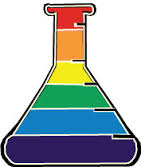Difference between revisions of "LGBTQ Biologists and Chemists"
| Line 7: | Line 7: | ||
The scientific community has been slowly establishing LGBTQ interest groups over the past few years. Of note to the community of biologists and chemists is the 'National Organization of Gay & Lesbian Scientists and Technical Professionals' (NOGLSTP), and the 'LGBT Chemists and Allies' group, both of the United States. | The scientific community has been slowly establishing LGBTQ interest groups over the past few years. Of note to the community of biologists and chemists is the 'National Organization of Gay & Lesbian Scientists and Technical Professionals' (NOGLSTP), and the 'LGBT Chemists and Allies' group, both of the United States. | ||
| − | We have identified the following LGBTQ scientists in the fields of biology and chemistry. They hail from Israel, the United States, Sweden, Portugal, and Great Britain. | + | We have identified the following LGBTQ scientists in the fields of biology and chemistry. They hail from Israel, the United States, Sweden, Portugal, and Great Britain. Many in the group have received prestigious national and international awards and recognitions, including the Kistler Prize (one of the foremost scientific awards in the world) and Discover magazine's 'Scientist of the Year'. |
* [[Barbara Belmont]], USA | * [[Barbara Belmont]], USA | ||
Revision as of 19:47, 27 October 2014
Chemists and Biologists who openly identify as LGBTQ should be of particular interest to the community at large. There has been a long running discourse on the issue of discovering a 'gay gene', for example, and whether or not being LGBTQ is hereditary or adopted and learned. Academic and scientific study continues in these fields.
There is no question about the importance of diversity in the chemistry and biology worlds. However, in the past the foremost participants have been white males and the professions have not been particularly successful, nor active, in attracting diversity. Having diversity allows complex scientific issues to be addressed from multiple angles, encouraging innovation in their fields of study. Regrettably, studies show that sexual identity is generally 'off the radar' (see the article 'Diversity in the Chemical Sciences' below).
The scientific community has been slowly establishing LGBTQ interest groups over the past few years. Of note to the community of biologists and chemists is the 'National Organization of Gay & Lesbian Scientists and Technical Professionals' (NOGLSTP), and the 'LGBT Chemists and Allies' group, both of the United States.
We have identified the following LGBTQ scientists in the fields of biology and chemistry. They hail from Israel, the United States, Sweden, Portugal, and Great Britain. Many in the group have received prestigious national and international awards and recognitions, including the Kistler Prize (one of the foremost scientific awards in the world) and Discover magazine's 'Scientist of the Year'.
- Barbara Belmont, USA
- Carolyn Bertozzi, USA
- Rochelle Diamond, USA
- Uzi Even, Israel
- Anne Fausto-Sterling, USA
- Janice Hicks, USA
- Simon LeVay, Great Britain
- Svante Paabo, Sweden
- Alexandre Quintanilha, Portugal
- Joan Roughgarden, USA
- Julia Serano, USA
- Bruce Voeller, USA

